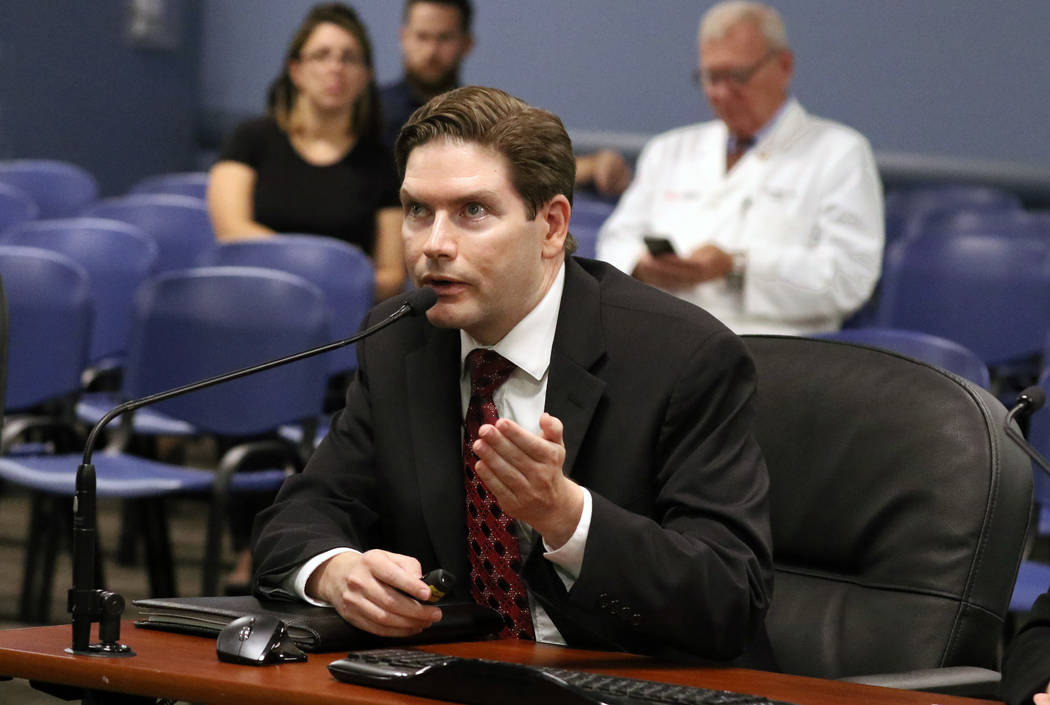Las Vegas restaurants, resorts resist inspection fee proposal

Faced with criticism from the restaurant, retail and resort associations, the Southern Nevada Health District board decided Thursday to delay a vote scheduled for next month on proposed new or higher inspection fees for restaurants.
Board members signaled that increases would still be coming, but only after further discussion with representatives of the affected industries.
“We’re bleeding, and we need the Board of Health’s help,” Chris Saxton, director of environmental health at the health district, told the district’s policymaking board at a public hearing.
The district hasn’t increased its environmental health fees in a decade, Saxton told the board. The Environmental Health Division experienced a nearly half-million-dollar net loss in fiscal 2018, and it projects deficits of $1.6 million for 2019 and $1.7 million for 2020.
But business representatives sought assurances that new fees and increases would pay for associated services and would not be used to offset other costs. They also expressed concerns that the new restaurant fees could damage an industry that already operates on thin margins.
Virginia Valentine, president of the Nevada Resort Association, told the board that the district had not provided “clear and consistent data” to support the proposed fees. She said a general-purpose function such as “vector control” — programs targeting mosquitoes or animals that spread disease — should be paid for out of the district’s general fund, whose revenues come from property taxes, and not passed on in the form of restaurant fees.
“The burden should not be solely borne by them,” Valentine said.
Heavy hitters opposed
Representatives of the Nevada Restaurant Association, the Retail Association of Nevada, the Las Vegas Metro Chamber of Commerce and the Latin Chamber of Commerce appeared before the board to voice concerns about the proposal.
Speakers singled out for particular criticism proposed new fees related to restaurant inspections. The district proposed a new fee of $400 for a restaurant whose “A” health grade is downgraded to a “B” after a health inspector records 14 to 17 demerits. The fee would increase to $600 for a downgrade involving 18 to 20 demerits.
“It’s very easy to get a ‘B’ grade in Las Vegas,” said Cara Evangelista, an environmental health specialist with Impact Food Safety & Environmental Service, whose clients include restaurants. Evangelista said a restaurant could get a “B” grade for offenses as small as “ice in a hand sink.”
She and others also expressed concern that such a fee structure could be seen as an incentive for inspectors to find more demerits, while failing to provide the district with a consistent source of revenue.
Speakers also told the board that small mom-and-pop restaurants could be especially hard hit under the fee structure.
“I do believe it (the restaurant business) is the hardest industry in the world,” restaurant owner Joe Djavairian told the board. “I know what it’s like to be bleeding.”
Djavairian, who with his brother started the family-run Angelina’s Pizzeria & Italian Kitchen chain, said he believes across-the-board increases in annual fees would be a better way to address the issue. Following the meeting, he said his family’s four restaurants currently pay between $1,300 and $1,500 in annual fees.
More study ahead
Even before public comment on the proposal, board Chairman Scott Black suggested that the district take the next 12 months to fully evaluate fee proposals and consider imposing some smaller fees in the interim.
“Let’s find out how much they’re bleeding,” Black said about the Environmental Health Division. “In the meantime, let’s not let them pass out.”
He said the district needs $400,000 in the near term to fund cost-of-living and step increases for employees that were approved in the district’s collective bargaining agreement.
Instead of voting next month on the proposed fees, the board’s finance committee is expected to meet with an advisory committee reviewing the increases to hash out a new proposal.
“I’d like to see a product that everyone can support — or everyone who is reasonable can support,” Black said.
Contact Mary Hynes at mhynes@reviewjournal.com or 702-383-0336. Follow @MaryHynes1 on Twitter.